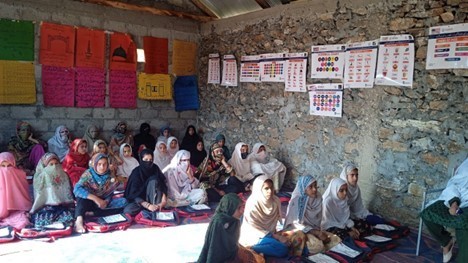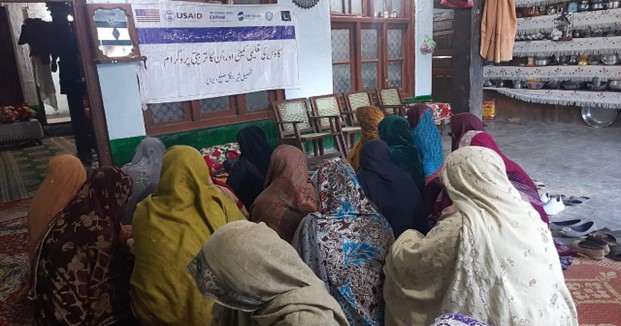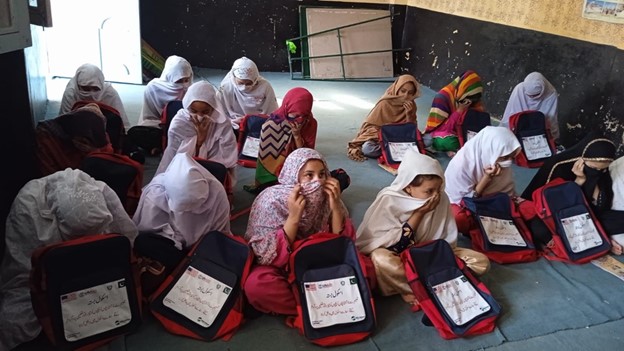Success Story
Featured Partner: National Integrated Development Association (NIDA) Pakistan
February 13, 2023
The National Integrated Development Association (NIDA) Pakistan was established in 2008 to catalyze positive social change by mobilizing groups that are marginalized due to gender, ethnicity, disability, education, income, or geography to advance sustainable development. Working across all provinces in Pakistan, NIDA-Pakistan has successfully implemented 40 projects in different sectors including education, health, livelihoods, natural resource management, culture, water, sanitation and hygiene (WASH), reproductive health, human rights, institutional development, youth and women’s empowerment, gender mainstreaming and disaster risk reduction.

A second opportunity for adolescent girls to continue their education
Under NPI EXPAND, NIDA-Pakistan is supporting the Government of Khyber Pakhtunkhwa’s efforts to increase access to and improve the quality of primary and secondary education. In Buner District, where middle school retention rates are low for girls (57%) and boys (64%), most of the out of school children have “aged out” of formal education due to dropping out of school before completing elementary school. Such children face difficulty in being readmitted to schools due to formal school policy around age requirements. Therefore, they need a second chance to complete basic education. To address this problem, NIDA-Pakistan is implementing an Accelerated Learning Program (ALP) to provide non-formal education services to the most marginalized and excluded communities in Chagharzi and Gadezai tehsils (district sub-divisions). ALP is a condensed curriculum designed and approved by the Government of Khyber Pakhtunkhwa, offering learning opportunities for older out-of-school children in the province, who have missed out on education at the appropriate age by providing flexible timings and allowing them to complete of the missed grades in an accelerated manner and eventually return to formal school settings.

Village Education Committee members in a sensitization session on the importance of girls’ education
NIDA-Pakistan used a comprehensive and inclusive community-based approach to create a sense of ownership among the community for the ALP and reduce barriers to education in Buner District. This approach included establishing and strengthening Village Education Committees to act as catalysts for enrolling out-of-school children into ALP centers and formal schools. These committees contributed to raising awareness of the importance of education, specifically girls’ education, and coordinated with parents, elected representatives, and education officials.
Since the project launched, NIDA-Pakistan has established 30 ALP Centers (12 for males and 18 for females) to enable out-of-school children to re-enroll. As a result, 1,200 out-of-school children (60% of whom are girls) have enrolled in the ALP and have restarted their education. Community members are proud of these successes. Sher Zarmeen, the General secretary of Najdara Welfare Organization, said:
“There is no middle or high school in the village constraining children to drop out at quite an early stage of their education. Ninety-five per cent of girls remained without education due to the unavailability of a local-level middle school. However, I feel excited to share with you that our friends from NIDA-Pakistan and USAID have established an ALP center in the village. The girls who had discontinued their education are now enrolled again. They will soon be able to get admitted to formal schools again.”

Girls at an ALP center with schoolbags provided by the project
NIDA uses a community-based participatory approach to engage communities in decision-making processes and foster ownership and sustainability. As a result of NIDA-Pakistan’s participatory and community-led approach, the work will continue to see results even after the project ends. Village Education Committees will continue to work on non-formal education programs even after NIDA-Pakistan completes this project and exits the community, since their technical and project management capacities will have been strengthened throughout the project. Their involvement will also streamline the process for transitioning the children to the formal education system once they are ready.
For more information on NIDA, please contact:
Name: Muhammad Arif
Address: House No. 4, Township Besham District Shangla, Post Code 20500 KP, Pakistan
Phone: +92-3449685354
Website: https://nidapakistan.org/